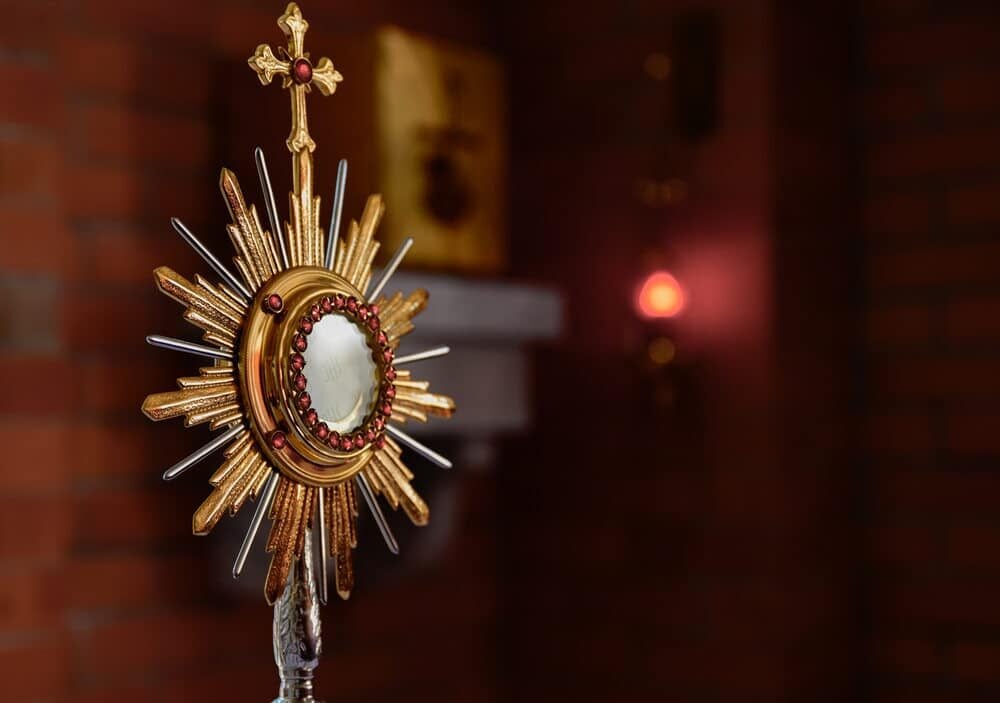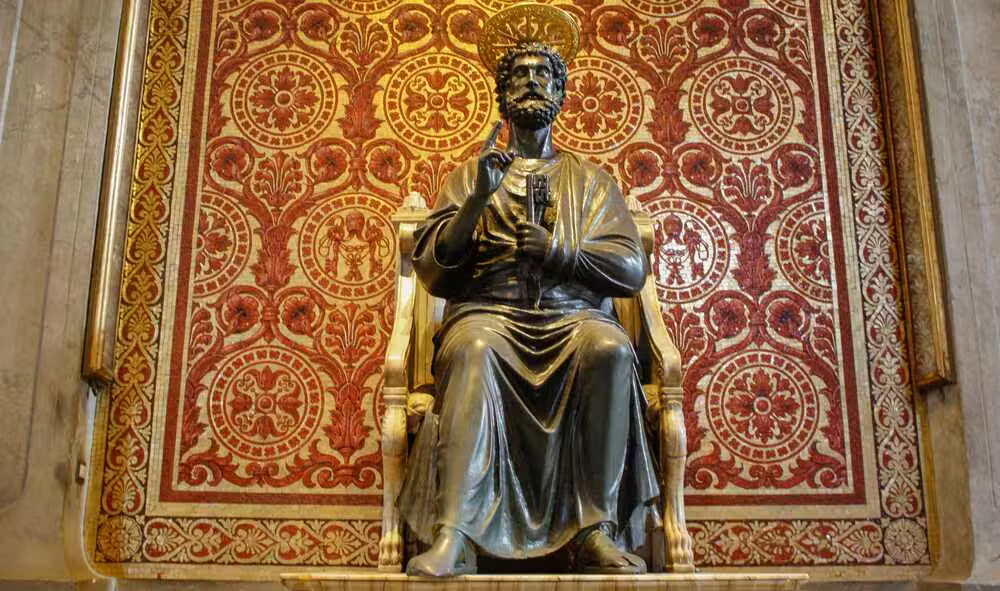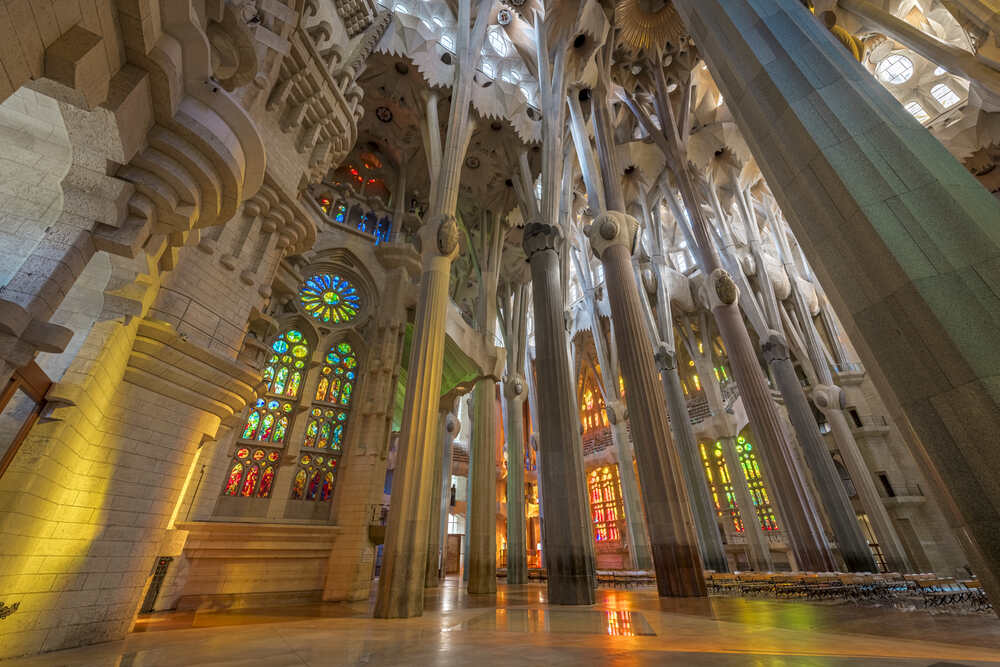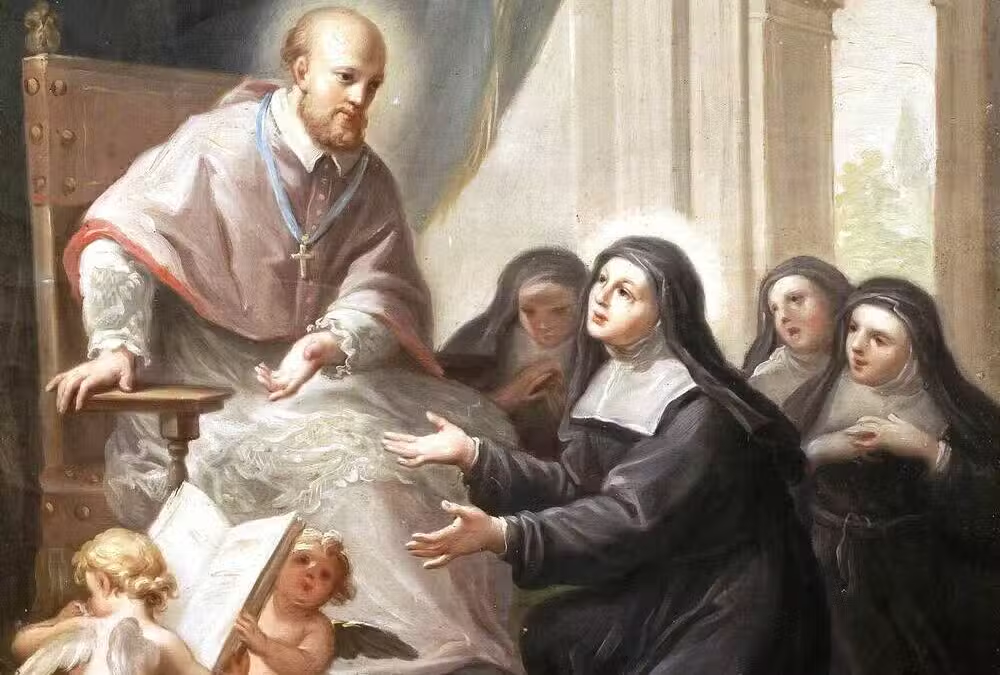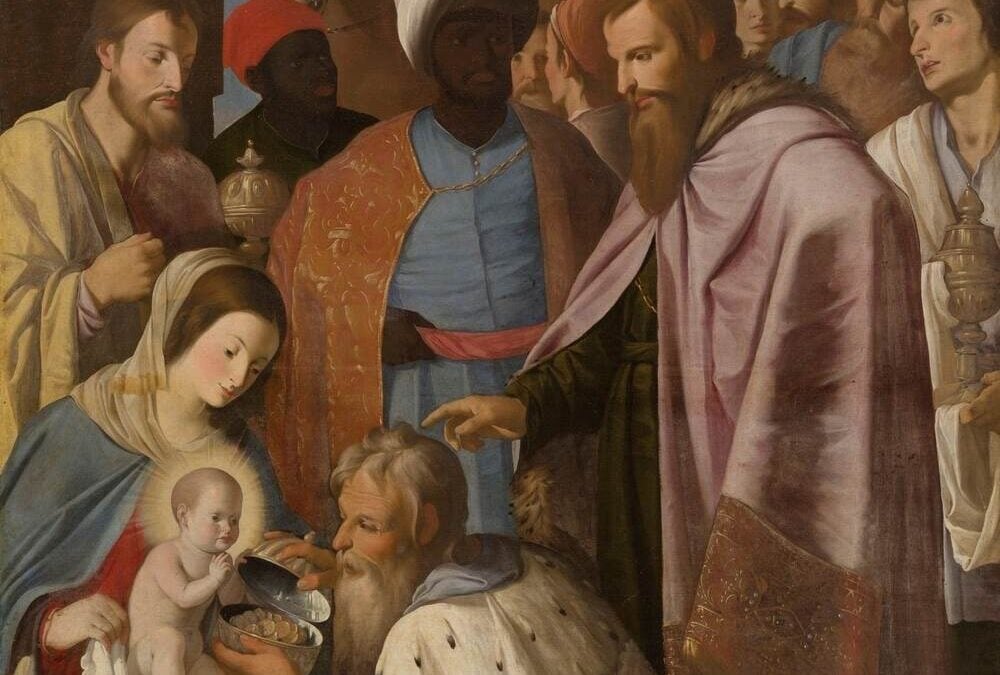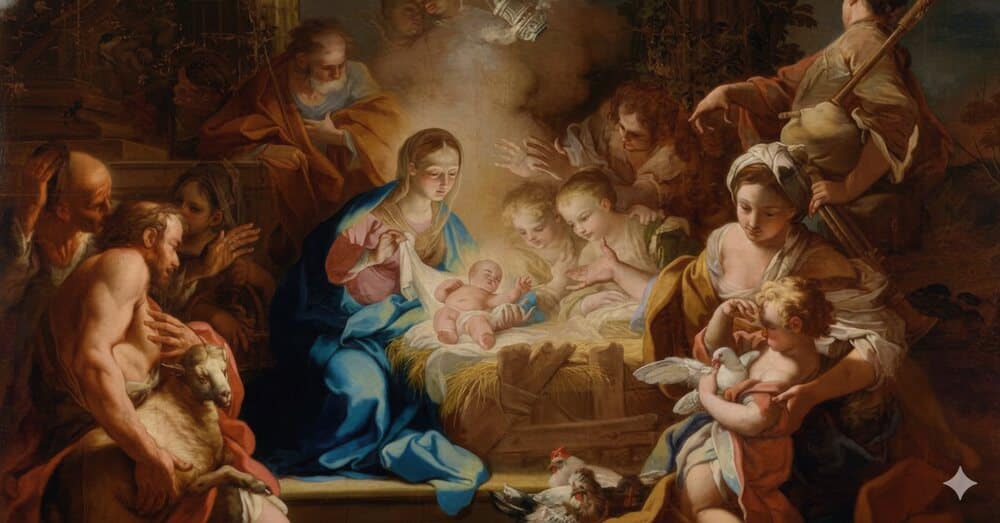Editor’s Note: The following is an adaptation of a talk given by Dr. Michael A. Dauphinais at Ave Maria Parish, Florida, on April 2, 2025. The original video is available (in English) at https://vimeo.com/1070449975 and https://vimeo.com/1071987228
Dr. Michael A. Dauphinais serves as the Chair of the Theology department at Ave Maria University. He works as the Father Matthew Lamb Professor of Catholic Theology and co-director of the Aquinas Center for Theological Renewal. He is also the host of the Catholic Theology Show podcast, available on your preferred podcast provider.
You can use the Catholic Mass Times app to find the nearest Catholic church with Mass, Confession, and Adoration schedules. It will surely help you! Download it now.
This Lent, we’ve been making a journey home to the Father, reflecting on radical faith, radical hope, and now, radical love. By “radical,” I mean something total and complete—believing so deeply that I no longer need anything to be different.
- Radical faith: believing in God’s promises completely.
- Radical hope: trusting in Him so fully that circumstances don’t need to change.
- Radical love: loving God, myself, and my neighbor as they are, without needing them to be different.
We are making a journey from doubt to faith, from despair to hope, from resentment to love—from a hellish exile to a heavenly home.
From Exile to Rescue
Faith begins with an admission of bankruptcy. If we think we can bargain with God—offering a little and expecting a little in return—we’re not dealing with the Christian God.
The Gospel only begins to speak when we recognize we can do nothing on our own. We are in distress, in sin and death, and under the confusion of the devil.
Imagine being an astronaut on a space station. You go out for a spacewalk—but without a tether. You were made to be connected, to be in communion with God, but in pride, you say, “I want to be God.” You let go and start drifting.
When you realize that you made a bad decision, you try to fix things on your own, but you’re powerless. You can’t stop the drift. You are exiled, cut off from communion.
So what does Jesus do?
He sees us drifting and dives after us on a search and rescue mission. He grabs us in our exile, takes our death upon himself, and throws us back to the Father. He dies fully—so fully that his human nature dies for three days. But because he is rooted in divine love, he rises.
That’s what he does.
And yet, we still have a choice to make. The offer of grace has been given—but we must respond.
The Boy Who Became a Dragon
In C.S. Lewis’s Voyage of the Dawn Treader, Eustace Clarence Scrubb—who Lewis says “almost deserved the name”—enters a world he doesn’t understand. He complains about everything, criticizes everyone, and avoids responsibility.
One day, he wanders into a valley to nap and sees a dragon die. Watching it, he even imagines he defeated it himself. He finds a hoard of treasure, lies down to sleep on it with greedy, dragonish thoughts—and wakes up a dragon.
In Christian symbolism, the dragon is an image of sin, the ancient serpent from the Garden. Eustace becomes a monster—cut off from the human race.
At first, he wants revenge, but soon he realizes he just wants friendship. He wants communion. But he can’t have it—he’s still a dragon.
No one can fix him. They can’t get him off the island, and he can’t fly. He’s stuck.
Until Aslan appears.
This Christ figure, Aslan the lion, leads Eustace to a fountain of water and tells him to bathe—but only after taking off his clothes. Eustace peels off one layer of skin, then another, then a third—but remains a dragon.
Then Aslan says, “You will have to let me undress you.” Eustace is terrified of his claws, but desperate. One of the treasures—an armband—is hurting him. So he lies down and lets Aslan tear off the skin.
The first tear goes so deep, Eustace says, “it went right into my heart.” It hurts more than anything. But after the lion strips it all away, he throws him into the water—and Eustace becomes a little boy again.
We are like Eustace. We have become dragons—and we cannot undragon ourselves.
Even our efforts at reform tend to fall back into the same patterns. After every retreat, every mission, every resolution to be kind, patient, or calm, we still fail.
Our efforts will never return us to the purity we had when God created us.
The One Who Forgives Sin
G.K. Chesterton, in his autobiography, said he became a Catholic to get rid of his sin. No other institution claims to do that. Others may say sin doesn’t exist or that you can fix it yourself. But only the Catholic Church offers actual forgiveness.
Chesterton said, “When a man goes into the confessional—no matter how old, gray, or gouty—he comes out five minutes old, a new boy” That’s what confession does. That’s what baptism does.
But it begins with admitting: I can’t save myself.
As St. John Paul II said, “The Gospel is fundamentally the initial ardent proclamation by which we are one day overwhelmed and brought to a decision to entrust our life to Jesus Christ in faith.”
It is the surrender of control, the handing over of our life to Christ.
Our Culture of Resentment and Loneliness
We live in a society wounded by loneliness and despair.
In 2021, the CDC reported that 40% of young people have persistent feelings of sadness and hopelessness. One in five has seriously considered suicide.
Girls’ major depression rates rose from 12% to 29% between 2010 and 2020; boys’ from 5% to 12%. And boys die by suicide at three times the rate.
In 2023, the U.S. Surgeon General declared loneliness a public health epidemic—more dangerous than smoking. From 1976 to now, loneliness among youth has risen every year. Church attendance has dropped over that same period.
Social media plays a significant role. From 2009 to 2013—the years smartphones became ubiquitous—there was a sharp spike in mental health issues and isolation. By 2011, 75% of teenagers had iPhones.
Jonathan Haidt, in The Anxious Generation, says we overprotect children in the real world and underprotect them in the virtual world. Kids no longer learn how to play, resolve conflict, or build friendships.
And yet, there’s hope. Millennials are attending church more than older generations. For the first time, more young men than young women go to church.
When people are desperate for hope, they turn to the Church.
Hamlet and the Fall of the Sparrow
Shakespeare’s Hamlet is a story of existential crisis. The famous line, “To be or not to be,” is not the real question. The real question is how to be.
Until we learn how to live, the question of whether to live will always torment us.
C.S. Lewis wrote that the world of Hamlet is one where everyone is “watching one another, forming theories about one another, listening, contriving, full of anxiety.”
This sounds eerily like social media—and our modern lives.
And in such a world, we cannot experience love!
But Lewis notes that Hamlet does eventually recover his path. In Act V, he says, “There is a special providence in the fall of a sparrow.”
He begins to trust divine providence again. That’s the key.
When we forget God, we fall into fear. And fear leads to resentment.
From Resentment to Radical Forgiveness
We all still carry remnants of our dragon skin. Resentment is one such remnant.
The word “resentment” means to re-sense—to feel again. A hurt that happened once can be re-felt a thousand times in memory.
Most of us think we aren’t resentful. But if we pause and reflect—resentments often bubble to the surface: parents, spouses, bosses, friends.
As long as we carry these, we cut ourselves off from communion with the Father.
Forgiveness doesn’t mean approving wrongdoing. It doesn’t mean condoning behavior or trusting someone who is untrustworthy.
Trust equals behavior over time. I can love someone and still not hand them the car keys.
Forgiveness is releasing the grip that resentment has over our hearts. “How empty of me to be so full of you.” Who is living rent-free in your head?
Radical forgiveness begins with radical acceptance: accepting things so completely that we don’t need them to be different. Because right now—they aren’t different.
The Power of the Cross
Jesus is our model: “Father, forgive them, for they know not what they do.
The Catechism (616) says, “Jesus knew and loved each one of us when he offered his life.”
He knew all of you—and still loved you. You don’t have to wear a mask before God.
We must also forgive ourselves—and even, in some cases, let go of blame toward God.
Many people carry a quiet resentment: Why did You let this happen? Why did You let that person walk away, leave, die?
St. Thérèse of Lisieux wrote, “I feel that I am charitable when it is Jesus alone who acts in me.”
She shared that one sister in the convent irritated her deeply. She practiced smiling every time she saw her. Eventually, that sister said, “Why do you love me so much?”
That was when Thérèse knew—it was Jesus in her, loving through her.
Forgiveness is a decision—not based on whether someone deserves it. It heals us. “Hate is heavy. Forgiveness is light.”
Life is Short, Eternity is Long
A survivor of the 1994 Rwandan genocide shared her story with me. She hid for 89 days in a 3-by-4-foot bathroom with six other women. Her father had given her a rosary before she hid.
In the darkness, she was overwhelmed with rage and grief. But the more she hated, the sicker she felt—physically, emotionally, spiritually. She began praying the rosary, and it brought her peace. Mary, Jesus, and the Holy Spirit were with her.
Eventually, she emerged. Her home had been destroyed. She collapsed and told God, “I can’t forgive. I can’t go on.”
And she heard in her heart: “Life is short. Eternity is long.”
Her family had finished their journey. Hers was still ahead. She stood up and eventually forgave—even the man who killed her brother. She became a missionary of reconciliation.
The Six “D’s” of Eucharistic Friendship
Radical love calls us to mission. In this year of Eucharistic Revival, we’re invited into Eucharistic friendship.
Here are six practices—six “D’s”—to restore relationships rooted in Christ:
1. Digital Detox
Smartphones intoxicate us. They trigger dopamine responses. Try a 28-day fast. Or 2.8 days. Or 28 hours. Or 28 minutes. Put your phone down and go for a walk.
We think phones ease our anxiety—but they actually increase it. They lead us to watch others, form theories, and fall into Hamlet-like anxiety.
2. Dragons
Relationships are hard among dragons. Remember that everyone you love is a dragon or a recovering dragon—and so are you.
We really have to lower the expectations that we’re going to get along well with each other in our families, among our workplaces, among our societies. It’s just not going to happen.
When we let go of the expectations that we ought to and recognize, hey, we’re doing pretty well considering we’re all dragons. And that will give us more room to responde with love. That’s progress.
3. Date Your Friends
Call a friend and schedule something: coffee, a walk, a shared meal.
Friendships among adults don’t happen spontaneously. As kids, we had proximity—classrooms, neighborhoods, dorms. Once we are adults, we must plan.
Be a missionary of friendship. Host dinners. Invite acquaintances.
One couple I know regularly hosts events for young Catholics—and dozens of marriages have resulted from their efforts.
Aquinas said, “There’s a joy that happens when friends see one another.”
That’s why gossip is such a grave sin—it robs people of the joy of being known and loved.
4. Detach with Love
This is hard—but essential. Each person is on their own journey. We are together, but we were also born alone and we will die alone, one by one. It means recognizing that we are responsible to others, not for them.
My children aren’t my children—they are God’s. I can do my part, but the outcomes belong to Him. Each of us is on our own journey.
5. Don’t Despair
We were born for this moment. In the 1400s, Joan of Arc said, “I do not fear… I was born for this.” So were we.
God chose us before the foundation of the world (Ephesians 1). We are here now, in 2025, for a reason.
6. Divine Providence
We must let go of control and trust God’s love.
Paul says in Romans 5:5 that “the love of God has been poured into our hearts through the Holy Spirit.”
And in Romans 8:28: “God works all things for good for those who love him.”
Jesus says in John 14, “I go and prepare a place for you… and I will come again and take you to myself.”
In Closing: From the Cross to Communion
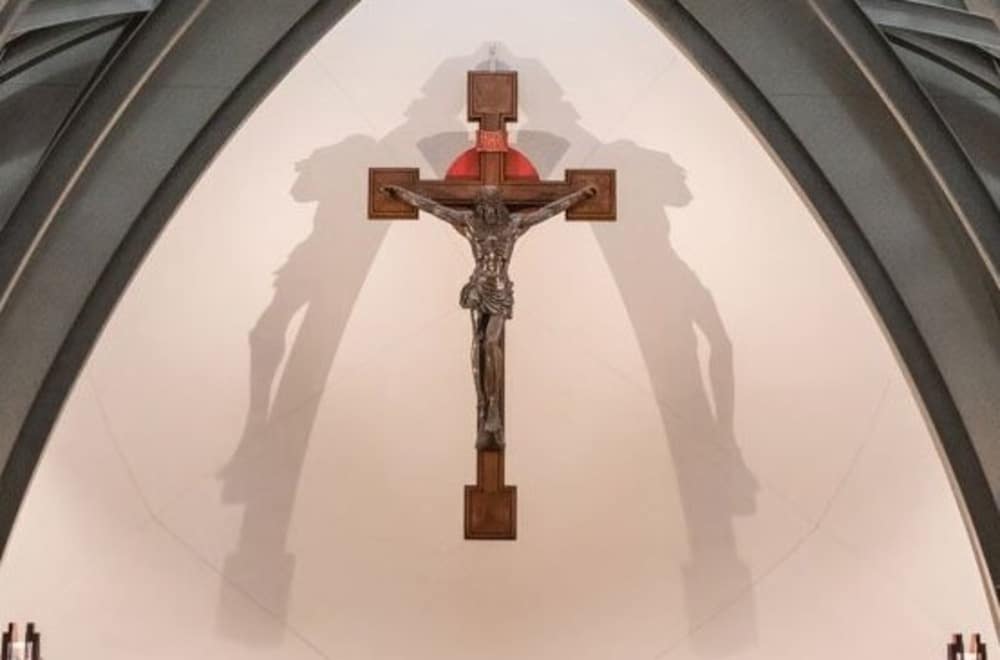
Look at the crucifix above me. Beside the central cross of Jesus, there is a shadowed cross on each side. I always imagined these as the two thieves’ crosses, and that well might have been the intention of the designer, but I ask you to look at it anew with me. One day, I suddenly saw Jesus there on the cross raising Adam and Eve from their crosses.
Like in Eastern icons of the Resurrection, where Christ reaches down to pull Adam and Eve from their tombs—Jesus also pulls us from our crosses.
We’ve made a mess of things. We’ve become dragons.
But in Christ, we are no longer dragons. One day, no trace of dragon skin will remain. In Jesus, we are restored to the Father, to ourselves, and to one another.
As Paul writes in 1 Corinthians 13: “Love bears all things, believes all things, hopes all things, endures all things.”
Radical love bears, believes, hopes, and endures—without needing anything to be different.
Final Reflection
So I invite you now to reflect:
What are the resentments that I’m clinging to? Where am I bitter?
Am I willing to stop being bitter and begin to let Jesus make me better?
Radical acceptance and radical forgiveness? Forgiveness is not equal to approval but accepting that it happened. Forgiving so completely, I don’t need it to be different.
Jesus, can you forgive me? This person for me? In me? Radical Love of Jesus so completely, I don’t need my past, present, future different.
Can I see Jesus loving me?
Wanting to be my friend in the Eucharist?
What are some specific friendships and relationships I might nurture?
What is one thing God is calling me to go on a mission?
Let us continue in quiet prayer, asking Jesus and the Holy Spirit to speak to our hearts about his love for us and our response. Listen for the Lord speaking in your heart as we hear the words of the hymn “O God, beyond all praising”:
O God beyond all praising,
we worship you today
and sing the love amazing
that songs cannot repay;
for we can only wonder
at every gift you send,
at blessings without number
and mercies without end:
we lift our hearts before you
and wait upon your word,
we honor and adore you,
our great and mighty Lord.–
Then hear, O gracious Savior,
accept the love we bring,
that we who know your favor
may serve you as our king;
and whether our tomorrows
be filled with good or ill,
we’II triumph through our sorrows
and rise to bless you still:
to marvel at your beauty
and glory in your ways,
and make a joyful duty
our sacrifice of praise.

